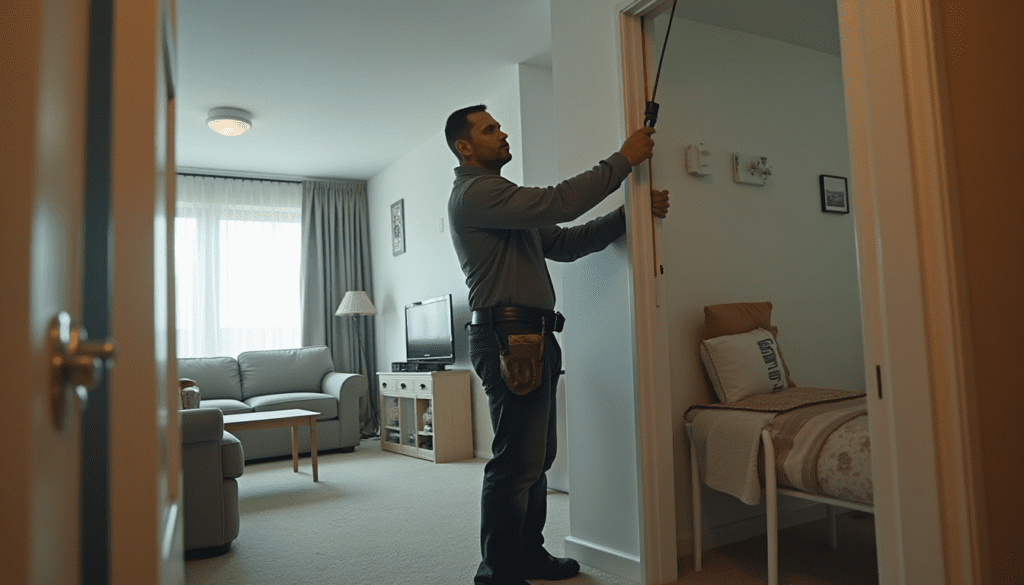For landlords and tenants in Essex County, New Jersey, understanding how long an eviction can take is critical. The legal framework in New Jersey sets out specific notice-periods, court procedures and timelines that dictate how quickly possession can be regained. This article walks you, step-by-step, through the process—from initial notice to court judgment to removal—and outlines what typical timeframes look like in Essex County, wherever local conditions allow.
Overview of Eviction Law in New Jersey
The eviction process in New Jersey begins with the principle that a landlord must have “good cause” to evict a residential tenant under the state’s Anti Eviction Act. :contentReference[oaicite:2]{index=2} For many eviction actions, particularly for non-payment of rent, landlords may proceed immediately, but other types of violations require the landlord to issue specific notices first. :contentReference[oaicite:3]{index=3} The legal proceedings then move through the courts: in Essex County this is done in the Special Civil Part of the Superior Court. :contentReference[oaicite:4]{index=4}
Legal Grounds for Eviction
In New Jersey, the landlord may file an eviction complaint for reasons such as failure to pay rent, lease violations or illegal activity on the premises. :contentReference[oaicite:5]{index=5} The type of basis affects the required notice period and thus influences the timeline. For example:
- Non-payment of rent: landlord can move to file immediately (no fixed waiting period) in certain cases. :contentReference[oaicite:6]{index=6}
- Lease violation (non-payment): typically a 30-day “Notice to Quit” if the issue is lease breach rather than immediate danger. :contentReference[oaicite:7]{index=7}
- Illegal activity or serious conduct (e.g., criminal acts on property): may trigger a 3-day notice to quit. :contentReference[oaicite:8]{index=8}
Key Statutes & Court Jurisdiction in Essex County
The court process is governed by the statutes like N.J.S.A. 2A:18-53 through 2A:18-84. :contentReference[oaicite:9]{index=9} The eviction action is filed in the Special Civil Part of the Superior Court in the county where the rental unit is located — so for Essex County landlords and tenants, that means filing locally in the Essex County court system. Preparing and filing the complaint correctly is essential to avoid delays. :contentReference[oaicite:10]{index=10}
Pre-Filing Stage: Notices & Timing
The timeline really starts when the landlord serves the first formal written notice. The length of time before filing depends on the reason for eviction. Getting the notice portion right helps ensure you stay within the correct legal schedule.
Notice to Quit for Non-payment of Rent
If a tenant fails to pay rent, New Jersey law allows the landlord to effectively move toward eviction without a long waiting period: the landlord may serve a rent demand and after non-compliance, file the complaint. :contentReference[oaicite:11]{index=11} In other words, the timeline can begin almost immediately after the tenant falls behind and the landlord has given the appropriate demand.
However, even in this scenario, the landlord must follow service rules (serving summons/complaint properly) and the process still advances through court steps which take time.
Notice to Quit for Lease Violations or Illegal Conduct
For lease violations not involving rent (such as unauthorized pets, damage, or other breaches), the landlord must serve a written notice explaining the violation and giving the tenant time to fix it or vacate. Typically, this is a 30-day notice unless the violation is serious. :contentReference[oaicite:12]{index=12}
For serious misconduct—illegal activity or actions that threaten safety—the landlord can issue a “three-day notice to quit” (i.e., three days to vacate) which accelerates the process. :contentReference[oaicite:13]{index=13}
Filing the Complaint and Serving the Tenant
Once the notice period has passed and the tenant has not complied (or paid, vacated or corrected as required), the landlord can file the eviction complaint in the proper court. For Essex County, this means filing in the Special Civil Part. From filing to service, to court scheduling, there are additional time-elements to consider.
Court Forms & Filing in Essex County
The landlord must prepare the complaint, attach copies of required notices (especially if not a non-payment case) and pay filing fees. The forms and rules follow the state’s guidelines via the courts. :contentReference[oaicite:14]{index=14} Once the complaint is accepted, the court issues the summons which must be served on the tenant — either personally, by posting, or by other permitted methods. :contentReference[oaicite:15]{index=15}
Service of Summons & Complaint (Special Civil Part)
After filing, the next step is serving the tenant with the summons and complaint. Only after service can the court schedule a hearing. The time it takes from filing to hearing can vary depending on the court’s calendar and local backlog. One source indicates scheduling often takes “10-30 days” after filing in New Jersey. :contentReference[oaicite:16]{index=16}
It’s important to recognise that in Essex County, New Jersey local factors like court caseload, service method, and tenant responses can affect the speed of this stage.
Waiting for the Hearing: Typical Timeframes
The period between the filing of the complaint/serving the tenant and the hearing itself is where many timelines widen. The court must set the hearing date, both parties must be notified, and certain procedural steps must be completed.
Cases for Non-payment vs Other Violations
In non-payment cases, because the notice requirement is minimal, the landlord may advance more quickly to filing and hearing. Some practitioners note that in certain New Jersey counties the hearing is scheduled 2-6 weeks after filing. :contentReference[oaicite:18]{index=18} For other lease-violation or illegal-conduct cases, the notice period plus the filing/service/waiting period can add weeks or even a month or more before the hearing occurs. :contentReference[oaicite:19]{index=19}
How Tenant Response or Defense Impacts Timing
If the tenant chooses to contest the eviction, request a hardship stay or present other defenses (such as asserting habitability issues or discrimination), that can slow the timeline significantly. Under New Jersey law, tenants in non-payment cases may pay all rent plus costs up to three business days after eviction judgment, which can affect how soon actual removal occurs. :contentReference[oaicite:20]{index=20}
The Hearing and Judgment for Possession
Once the hearing date arrives, both landlord and tenant appear before a judge in the Essex County Special Civil Part. During this stage, the court reviews the complaint, supporting documents, and any tenant defenses. Hearings are generally straightforward in uncontested cases, often lasting only a few minutes. However, if the tenant raises defenses, presents counterclaims, or disputes rent amounts, it can take longer and potentially delay judgment. ([njcourts.gov](https://www.njcourts.gov/self-help/landlord-tenant?utm_source=chatgpt.com))
What Happens at the Hearing in Essex County
The judge listens to both parties. If the tenant fails to appear, the landlord may receive a default judgment for possession on the same day. If the tenant appears but doesn’t have a valid defense, judgment for possession is typically entered immediately following the hearing. In Essex County, the local backlog can slightly extend the waiting time for written judgment entry, usually adding three to seven business days. ([doorloop.com](https://www.doorloop.com/laws/new-jersey-eviction-process?utm_source=chatgpt.com))
If the tenant pays all rent due before judgment in non-payment cases, the case is dismissed. In all other circumstances, the landlord must wait for the court to issue the judgment for possession before moving to the next step — the Warrant of Removal.
Judgment Timing & What It Means
The judgment for possession does not authorize immediate removal. It legally recognizes the landlord’s right to regain possession of the rental property but must still go through the sheriff or court officer for enforcement. In Essex County, once judgment is entered, landlords must request a Warrant of Removal to begin the physical eviction process. ([azibo.com](https://www.azibo.com/blog/new-jersey-eviction-laws?utm_source=chatgpt.com))
Warrant of Removal and Physical Possession
The Warrant of Removal is the legal document that gives the Essex County Sheriff or court officer authority to remove the tenant from the property. This is the final enforcement phase of the eviction process in New Jersey. Landlords must formally request this document after receiving judgment for possession. The court clerk will then forward it to the Sheriff’s office for scheduling. ([njcourts.gov](https://www.njcourts.gov/self-help/landlord-tenant?utm_source=chatgpt.com))
Issuing the Warrant in NJ
In Essex County, the warrant is typically issued within three business days of the landlord’s request. Once issued, tenants receive notice of the pending removal. New Jersey law requires the Sheriff to wait at least three business days before performing the eviction. ([doorloop.com](https://www.doorloop.com/laws/new-jersey-eviction-process?utm_source=chatgpt.com)) This waiting period is meant to give tenants one last opportunity to vacate voluntarily or satisfy the judgment if applicable.
Time from Warrant to Eviction in Essex County
After the Sheriff’s notice period expires, the physical removal is scheduled based on the Sheriff’s availability. In Essex County, due to a heavy caseload, this can take another 7–14 business days. Therefore, while the state minimum allows eviction about six business days after judgment, the practical average in Essex County tends to be closer to 10–20 business days. ([newjerseyevictionlaw.com](https://newjerseyevictionlaw.com/law/the-step-by-step-guide-to-evicting-a-tenant-in-new-jersey-insights-from-a-new-jersey-landlord-attorney/?utm_source=chatgpt.com))
When the Sheriff carries out the removal, tenants must leave all belongings behind, and landlords must follow proper storage procedures if applicable. Landlords should not attempt “self-help” eviction or change locks themselves before the official removal, as this is illegal under New Jersey law. ([azibo.com](https://www.azibo.com/blog/new-jersey-eviction-laws?utm_source=chatgpt.com))
Average Timelines by Cause in Essex County
The time it takes to complete an eviction in Essex County can vary significantly depending on the reason for eviction and whether the case is contested. Below are average estimates compiled from official and legal sources. ([doorloop.com](https://www.doorloop.com/laws/new-jersey-eviction-process?utm_source=chatgpt.com))
Non-Payment of Rent Scenario
Non-payment cases typically move fastest because landlords can file almost immediately after rent is overdue. A typical Essex County non-payment eviction follows this pattern:
- Day 1–5 – Rent due but unpaid; landlord issues rent demand.
- Day 6–10 – Complaint filed and summons served.
- Day 20–40 – Court hearing scheduled and held.
- Day 40–50 – Judgment for possession entered.
- Day 55–70 – Warrant of Removal issued and enforced by Sheriff.
In total, non-payment evictions in Essex County average around 6–10 weeks if uncontested. Delays caused by tenant defenses, court backlogs or payment negotiations can extend this period.
Lease Violation or Illegal Conduct Scenario
When a landlord evicts for reasons other than non-payment, such as unauthorized pets, property damage, or illegal activity, additional notice time is required before filing. That makes the total timeline longer. Here’s a typical flow:
- Day 1 – Violation occurs and landlord issues Notice to Cease (if required).
- Day 30 – Landlord issues 30-day Notice to Quit for continued violations.
- Day 45–60 – Complaint filed in court.
- Day 75–90 – Court hearing scheduled and judgment entered.
- Day 95–110 – Warrant of Removal executed.
Total estimated time: roughly 10–14 weeks. Shorter for three-day notices involving illegal conduct. ([azibo.com](https://www.azibo.com/blog/new-jersey-eviction-laws?utm_source=chatgpt.com))
Contested vs Uncontested Evictions
An uncontested eviction, where the tenant doesn’t appear or respond, typically ends much faster—sometimes within 6–8 weeks from start to finish. Contested cases can take several months depending on how many hearings are required and whether appeals or hardship stays are filed. In Essex County, additional delays can arise from court scheduling and sheriff backlogs, particularly during peak housing-court periods. ([doorloop.com](https://www.doorloop.com/laws/new-jersey-eviction-process?utm_source=chatgpt.com))
Common Delays and How They Occur
Even when landlords follow every rule, several factors can extend the eviction process timeline in Essex County. Understanding these issues helps both landlords and tenants anticipate realistic outcomes.
Tenant Defenses, Hardship Stays & Orderly Removal
Tenants may ask the court for a “hardship stay” of up to six months under New Jersey law if immediate removal would cause extreme hardship and they can pay use and occupancy. ([njcourts.gov](https://www.njcourts.gov/self-help/landlord-tenant?utm_source=chatgpt.com)) This can significantly delay physical eviction. Additionally, tenants sometimes request an “orderly removal,” giving them additional days to move voluntarily before the Sheriff acts. Courts grant these stays on a case-by-case basis, depending on the tenant’s situation.
Other defenses, such as claims that the unit is uninhabitable or that the landlord did not provide required repairs, may also pause the process. Judges often want these issues addressed before granting final removal. ([lawdistrict.com](https://www.lawdistrict.com/articles/eviction-process-new-jersey?utm_source=chatgpt.com))
Court Backlog & Local Factors in Essex County
Essex County has one of the highest volumes of landlord-tenant filings in New Jersey, resulting in occasional scheduling delays, particularly during high-filing seasons. The Sheriff’s Office, responsible for carrying out removals, also manages limited daily capacity, which can stretch timelines by days or weeks. ([newjerseyevictionlaw.com](https://newjerseyevictionlaw.com/law/the-step-by-step-guide-to-evicting-a-tenant-in-new-jersey-insights-from-a-new-jersey-landlord-attorney/?utm_source=chatgpt.com))
By understanding these practical realities, landlords can better plan around court schedules, and tenants can know what to expect during the eviction process timeline in Essex County, NJ.
Best Practices for Landlords to Stay on Schedule
For landlords in Essex County, staying on top of procedural details is the key to avoiding unnecessary delays. While eviction laws are standardized across New Jersey, every county court—including Essex County—has its own rhythm and administrative load. Knowing what to expect and preparing in advance keeps the process efficient and compliant.
Documentation and Notice Accuracy
The most common reason eviction cases are delayed or dismissed is paperwork errors. Landlords should double-check every notice and document before filing. Ensure the Notice to Quit includes all legally required elements such as the date served, specific reason for eviction, and whether the tenant has a right to cure. Using certified mail or personal service with proof of delivery helps protect the case if the tenant later claims non-receipt. ([njcourts.gov](https://www.njcourts.gov/self-help/landlord-tenant?utm_source=chatgpt.com))
Maintaining accurate rent ledgers, lease copies, and communication records also strengthens the landlord’s position. Many Essex County property owners use professional management services such as RentShield Property Management to ensure documentation meets legal standards before filing.
Choosing the Right Timeline Strategy
Eviction strategy should depend on both the cause and tenant history. For example, a landlord dealing with chronic late payments may start with a “Notice to Cease” before escalating to a “Notice to Quit.” This creates a clean paper trail if the issue persists. Meanwhile, landlords facing dangerous or illegal conduct should proceed with the shortest legal timeline—typically a three-day notice—to protect property and other tenants. ([doorloop.com](https://www.doorloop.com/laws/new-jersey-eviction-process?utm_source=chatgpt.com))

What Tenants Should Know About the Timeline
Tenants also benefit from understanding how the eviction timeline works in Essex County. The law provides specific protections, and knowing these rights can help tenants avoid sudden displacement or negotiate more time when facing hardship.
Rights During the Notice & Hearing Phases
Under New Jersey law, tenants must receive proper written notice before any eviction filing (except for certain illegal acts). Tenants should carefully review the notice to ensure the landlord followed correct procedures. During the hearing phase, tenants have the right to appear in court, present defenses, and request more time under a hardship stay. ([azibo.com](https://www.azibo.com/blog/new-jersey-eviction-laws?utm_source=chatgpt.com))
If the eviction is for non-payment of rent, tenants can often prevent eviction by paying the full amount due—plus court costs—up to three business days after judgment. Knowing these rights empowers tenants to act quickly and responsibly. ([njcourts.gov](https://www.njcourts.gov/self-help/landlord-tenant?utm_source=chatgpt.com))
Options to Delay or Prevent Eviction
Tenants may ask the court for additional time under the “orderly removal” rule, which typically allows several extra days before the Sheriff executes the Warrant of Removal. In cases of proven financial hardship, judges may also grant up to a six-month stay. However, these options depend on the tenant’s ability to pay ongoing use and occupancy fees and show good faith efforts to relocate. ([lawdistrict.com](https://www.lawdistrict.com/articles/eviction-process-new-jersey?utm_source=chatgpt.com))

Specifics for Essex County Courts & Sheriff Enforcement
The Essex County Special Civil Part manages all local eviction cases. Once a judgment for possession is issued, the process transfers to the Essex County Sheriff’s Office for enforcement. The Sheriff handles Warrant of Removal scheduling and physical lockouts. ([newjerseyevictionlaw.com](https://newjerseyevictionlaw.com/law/the-step-by-step-guide-to-evicting-a-tenant-in-new-jersey-insights-from-a-new-jersey-landlord-attorney/?utm_source=chatgpt.com))
Role of Essex County Sheriff in Warrant Execution
After receiving the warrant, the Sheriff notifies the tenant—usually by posting the notice on the property—giving at least three business days’ notice before the scheduled eviction. On the removal date, the Sheriff will supervise the lockout to ensure the process complies with state law. Only the Sheriff may perform the actual eviction; landlords who try to change locks or move possessions themselves risk penalties for “self-help eviction.” ([doorloop.com](https://www.doorloop.com/laws/new-jersey-eviction-process?utm_source=chatgpt.com))
Local Court Resources & Contact Info
Landlords and tenants can reach out directly to Essex County’s landlord-tenant division for status updates or procedural questions:
- Essex County Special Civil Part (Landlord-Tenant Section)
50 W Market St, Newark, NJ 07102
Phone: (973) 776-9300 ext. 56760 - Essex County Sheriff’s Office – Civil Process Unit
50 W Market St, Newark, NJ 07102
Phone: (973) 621-4111
These offices provide scheduling updates, forms, and guidance on eviction enforcement dates within Essex County.
Case Study: Typical Timeline Example in Essex County
To illustrate how the eviction timeline unfolds, let’s walk through a common scenario for a non-payment case. Suppose rent is due on the first of the month, and the tenant fails to pay by the fifth.
- Week 1: The landlord issues a rent demand notice.
- Week 2: The tenant still hasn’t paid; landlord files a complaint in the Essex County Special Civil Part.
- Week 4: The tenant is served and receives a hearing notice.
- Week 6: Court hearing occurs; landlord wins judgment for possession.
- Week 8–9: The landlord requests and receives a Warrant of Removal from the Sheriff’s Office.
- Week 10: Sheriff executes eviction; landlord regains possession.
This straightforward timeline—roughly ten weeks—assumes no tenant defenses or payment arrangements. Contested or delayed cases may extend to twelve weeks or more, particularly when the Sheriff’s calendar is backlogged. ([doorloop.com](https://www.doorloop.com/laws/new-jersey-eviction-process?utm_source=chatgpt.com))
Variations Based on Tenant Response
If the tenant pays before judgment, the case is dismissed. If they appear in court and request a stay, the process can extend up to six months under specific hardship provisions. Understanding these variations allows landlords to manage expectations realistically and plan turnover or repairs accordingly. ([njcourts.gov](https://www.njcourts.gov/self-help/landlord-tenant?utm_source=chatgpt.com))
Conclusion & Key Takeaways
Eviction timelines in Essex County, NJ, follow the same legal framework as the rest of New Jersey but can vary widely depending on cause, court load, and tenant cooperation. For non-payment of rent, expect about 6–10 weeks; for other violations, closer to 10–14 weeks. Landlords should maintain clear documentation, follow every statutory notice rule, and avoid “self-help” actions. Tenants should know their rights to appear, pay arrears, or request additional time. Both sides benefit from understanding each stage of the process to minimize stress and uncertainty.
If you’re a landlord in Essex County looking to handle an eviction legally and efficiently, RentShield Property Management can guide you through every step—from notice preparation to Sheriff coordination—ensuring compliance with New Jersey landlord-tenant law.
Disclaimer
The information in this article is provided for general informational purposes only and should not be considered legal advice. Laws and court procedures may change, and each situation is unique. For specific legal guidance, consult a qualified attorney familiar with New Jersey landlord-tenant law and Essex County court procedures.






